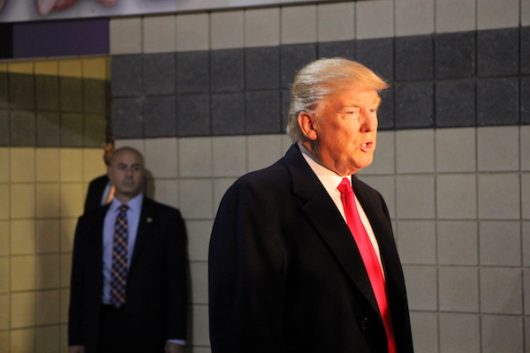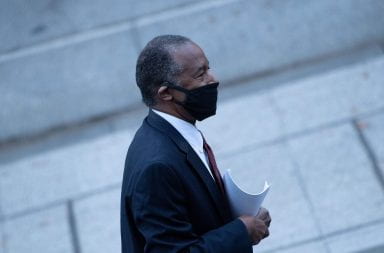
Then President-elect Donald Trump addresses the media at The Schottenstein Center on Dec. 8. Credit: Nick Roll | Campus Editor
Students hunting for federal government internships or employment might run into trouble at Ohio State’s upcoming career fairs.
On Jan. 23, President Donald Trump imposed a temporary hiring freeze for all federal agencies, except for those hiring military veterans or hiring for any situation related to national security and public safety.
“Every time there’s a new administration, there’s always questions about hiring,” said Chris Adams, assistant director of student admissions at the John Glenn College of Public Affairs. “And internships aren’t always at the top of the priority list for new leaders coming in.”
Adams explained that government agencies might be less likely to bring in new interns because of other priorities within the government.
“But on the other hand, a hiring freeze means less full-time employees, and more work for interns,” Adams said. “Basically, we don’t really know at this point.”
The career office in the College of Food, Agricultural and Environmental Sciences expressed similar thoughts.
“Every single time there’s large elections, there’s always questions on ‘How many hires can we make?’ or, ‘Are we going to be able to make hires?’ or if there’s going to be a freeze,” said Adam Cahill, career development manager for CFAES.
Cahill said his office was pleasantly surprised with the number of government interest in attending its career fair on Thursday, with more than a dozen organizations signed up.
The hiring freeze is set to last 90 days, or until the White House’s Office of Management and Budget creates a plan to decrease the government’s size through means such as retirement and resignation.
Adams and Cahill encouraged students to continue submitting their applications, regardless of the freeze, and to follow up with hiring managers about their application status. After the initial 90-day freeze, employers might be rushing to fill vacant positions and hire new full-time staff and interns, Cahill said.
“Stay optimistic about it,” he said. “Things will more than likely become available again in the near future.”
Adams explained that regardless of the hiring freeze, “people that retire need to be replaced,” citing a report by the Government Accountability Office.
The report anticipates that 31 percent of federal employees will be eligible to retire by September 2017, meaning approximately 600,000 positions could need to be filled.
Adams said that whatever someone’s thoughts are about the current political climate in Washington, he or she shouldn’t away from public service as a career path.
“It’s not just Washington. It’s your state government, local government, local communities (and) nonprofit organizations,” Adams said. “There are so many ways to still be involved and make an impact at the grassroots level.”


